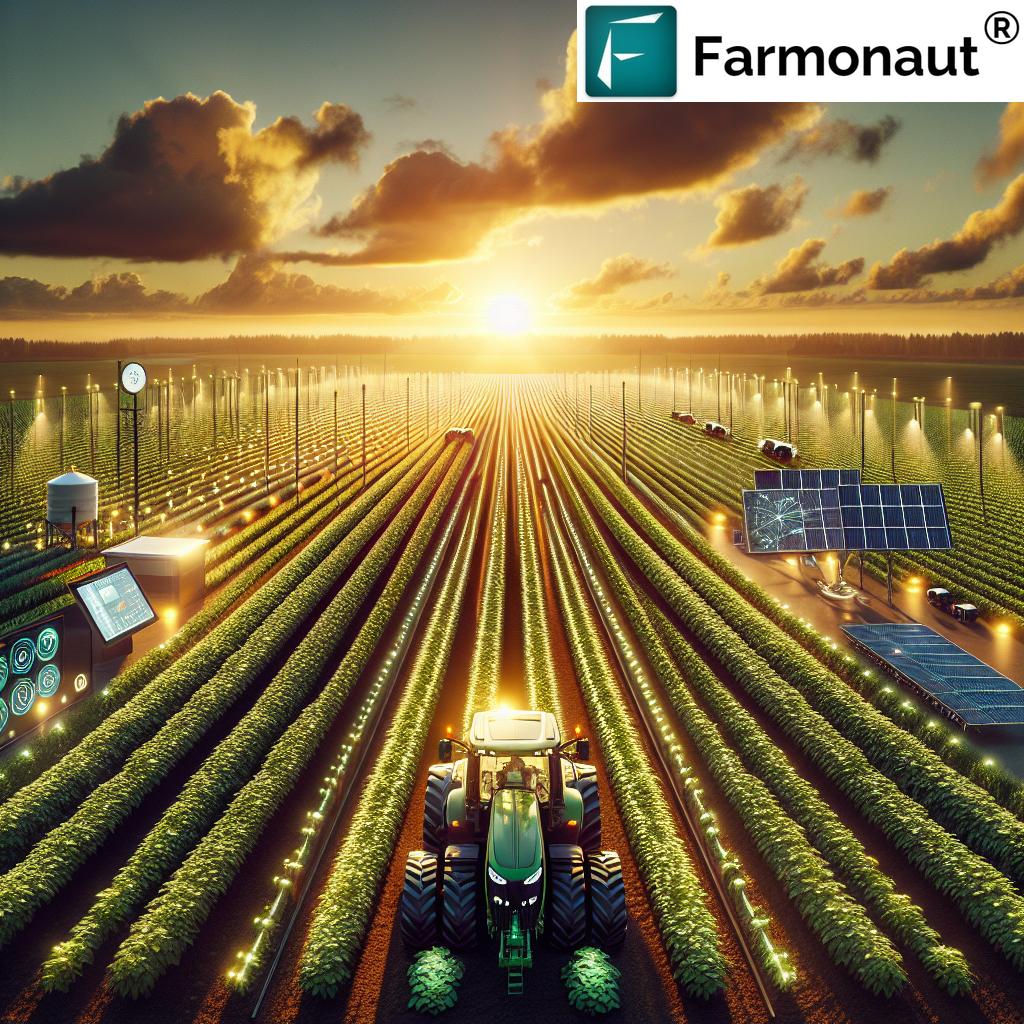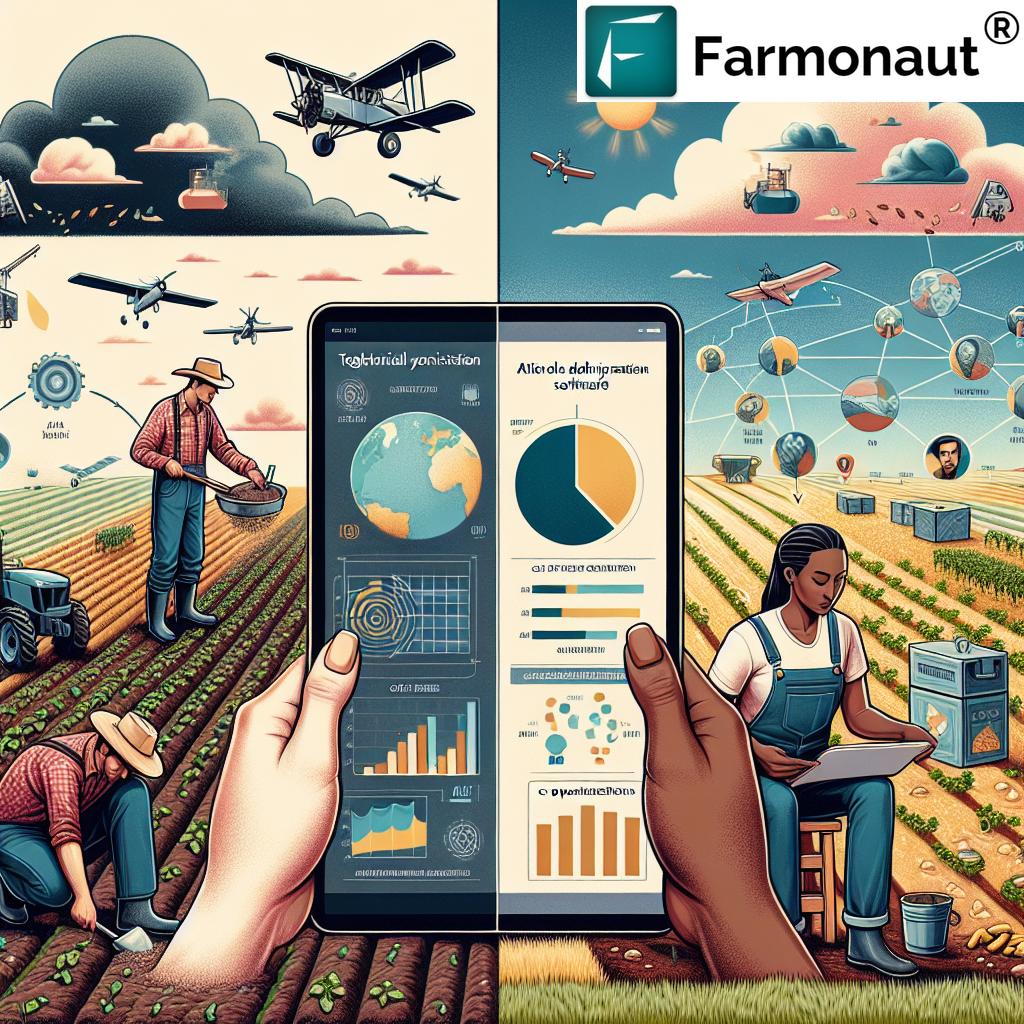Revolutionizing Agriculture: How Smart Farming Technologies Are Shaping the Future of Food Production
“Precision agriculture can increase crop yields by up to 30% while reducing water usage by 50%.”
In an era where global food security and climate change are pressing concerns, the agricultural industry is undergoing a profound transformation. Smart farming technologies and precision agriculture solutions are at the forefront of this revolution, reshaping how we approach food production. At Farmonaut, we’re excited to be part of this change, offering cutting-edge satellite-based farm management solutions that are making precision agriculture more accessible and affordable for farmers worldwide.

The Rise of Smart Farming Technologies
Smart farming technologies encompass a wide range of innovative tools and practices that leverage data, automation, and connectivity to optimize agricultural operations. These advancements are not just improving efficiency; they’re fundamentally changing the way we grow food, manage resources, and interact with our environment.
- IoT in Agriculture: The Internet of Things (IoT) has found a natural home in farming, with smart sensors and connected devices providing real-time data on everything from soil moisture to crop health.
- Data-Driven Decision Making: With the wealth of information now available, farmers can make more informed decisions about planting, irrigation, and harvesting.
- Precision Agriculture Solutions: These technologies allow for the precise application of resources, reducing waste and improving yields.
At Farmonaut, we’ve harnessed the power of satellite imagery and artificial intelligence to provide farmers with unprecedented insights into their fields. Our platform offers real-time crop health monitoring, AI-based advisory systems, and resource management tools, all accessible through our web app, Android app, and iOS app.
Farm Management Software: The Digital Backbone of Modern Agriculture
Farm management software has become an essential tool for farmers looking to streamline their operations and boost productivity. These digital platforms integrate various aspects of farm management, from crop planning to financial tracking, providing a comprehensive overview of the farm’s performance.
- Centralized Data Management: All farm-related information is stored and accessed from a single platform, improving organization and efficiency.
- Real-Time Monitoring: Farmers can track crop growth, weather conditions, and equipment status in real-time, allowing for quick responses to changing conditions.
- Predictive Analytics: Advanced algorithms can forecast potential issues, helping farmers take preventive action.
Our Jeevn AI Advisory System at Farmonaut is a prime example of how farm management software can leverage artificial intelligence to provide personalized recommendations for crop management, helping farmers optimize their practices and improve yields.
Drones and Satellite Imagery: A Bird’s Eye View of Agriculture
The integration of drones and satellite imagery into agriculture has revolutionized how we monitor and manage crops. These technologies provide farmers with a comprehensive view of their fields, allowing for precise mapping and analysis of crop health, soil conditions, and more.
- Crop Health Assessment: Multispectral imaging can detect plant stress before it’s visible to the naked eye, enabling early intervention.
- Field Mapping: High-resolution imagery allows for accurate mapping of field boundaries, crop rows, and problem areas.
- Resource Allocation: By identifying areas that need attention, farmers can allocate resources more efficiently, reducing waste and improving yields.
At Farmonaut, we specialize in satellite-based crop health monitoring, providing farmers with valuable insights into vegetation health (NDVI), soil moisture levels, and other critical metrics. This data empowers farmers to make informed decisions about irrigation, fertilizer usage, and pest management, ultimately optimizing crop yields and reducing resource wastage.

Smart Sensors and IoT Devices: The Pulse of the Farm
Smart sensors and IoT devices are the nerve endings of the smart farm, constantly collecting and transmitting data on various environmental and crop factors. These devices play a crucial role in creating a connected, data-rich farming environment.
- Soil Monitoring: Sensors can measure soil moisture, temperature, and nutrient levels, helping optimize irrigation and fertilization.
- Weather Stations: On-farm weather stations provide localized climate data, enabling more accurate forecasting and decision-making.
- Equipment Tracking: IoT devices can monitor farm equipment, tracking usage, maintenance needs, and efficiency.
Our platform at Farmonaut integrates data from various sources, including satellite imagery and on-ground sensors, to provide a comprehensive view of farm conditions. This integration allows for more accurate predictions and recommendations, helping farmers make the most of their resources.
“Smart farming technologies have the potential to reduce agricultural greenhouse gas emissions by 10-20% globally.”
Robotics and Automation: The Future of Farm Labor
As labor shortages continue to challenge the agricultural sector, robotics and automation are stepping in to fill the gap. These technologies not only address labor issues but also bring precision and efficiency to various farming tasks.
- Autonomous Tractors: Self-driving tractors can perform tasks like plowing, planting, and harvesting with high precision.
- Robotic Harvesters: Specialized robots can harvest delicate crops like fruits and vegetables, reducing labor costs and improving efficiency.
- Automated Irrigation Systems: Smart irrigation systems can adjust water delivery based on real-time soil moisture data and weather forecasts.
While Farmonaut doesn’t directly manufacture robotics, our platform can integrate data from these automated systems, providing farmers with a holistic view of their operations and helping them optimize the use of their robotic workforce.
AI-Powered Analytics: Turning Data into Actionable Insights
Artificial Intelligence (AI) and Machine Learning (ML) are transforming how we analyze and interpret agricultural data. These technologies can process vast amounts of information to identify patterns, make predictions, and generate recommendations that would be impossible for humans to derive manually.
- Yield Prediction: AI models can forecast crop yields based on historical data, current conditions, and predictive analytics.
- Pest and Disease Detection: Machine learning algorithms can analyze images to identify early signs of pest infestations or crop diseases.
- Optimal Resource Allocation: AI can recommend the most efficient use of resources like water, fertilizer, and pesticides based on crop needs and environmental conditions.
Our Jeevn AI Advisory System at Farmonaut is a prime example of how AI can be leveraged in agriculture. By analyzing satellite data and other inputs, it generates customized advice for farmers, improving farm productivity and efficiency.
Climate-Smart Agriculture: Adapting to Environmental Challenges
As climate change continues to affect agricultural regions worldwide, climate-smart agriculture strategies are becoming increasingly important. These approaches aim to increase agricultural productivity while adapting to and mitigating the effects of climate change.
- Weather Forecasting: Advanced weather prediction models help farmers plan for extreme weather events and adjust their practices accordingly.
- Drought-Resistant Crops: Data-driven breeding programs are developing crop varieties that can thrive in changing climatic conditions.
- Carbon Sequestration: Smart farming practices can help increase soil carbon storage, contributing to climate change mitigation.
At Farmonaut, we’re committed to promoting sustainable farming practices. Our carbon footprint tracking feature helps agribusinesses monitor and reduce their environmental impact, providing real-time data on emissions and enabling steps towards sustainability.
Digital Platforms and Mobile Apps: Bringing Smart Farming to Your Fingertips
The proliferation of digital platforms and mobile apps has made smart farming technologies more accessible than ever before. These tools allow farmers to access critical information and control farm operations from anywhere, at any time.
- Mobile Crop Management: Apps enable farmers to track crop growth, schedule tasks, and receive alerts on potential issues.
- Remote Monitoring: Farmers can check on field conditions, equipment status, and even livestock health from their smartphones.
- Data Visualization: Complex farm data can be presented in easy-to-understand formats, facilitating better decision-making.
Farmonaut’s platform is accessible through web and mobile apps, making it easy for users to track and manage their farms from anywhere. Our API also allows developers and businesses to integrate our satellite and weather data into their own systems, fostering innovation in the agritech space.
The Future of Farming: Emerging Technologies and Trends
As we look to the future, several emerging technologies are poised to further revolutionize agriculture:
- Vertical Farming: Urban agriculture solutions that maximize space and reduce transportation costs.
- Gene Editing: CRISPR and other gene-editing technologies could create more resilient and productive crop varieties.
- Blockchain in Agriculture: Improving traceability and transparency in the food supply chain.
- 5G Connectivity: Faster, more reliable internet connections will enable real-time data processing and decision-making on farms.
At Farmonaut, we’re constantly innovating to stay ahead of these trends. Our blockchain-based product traceability solution, for example, is already helping to ensure transparency and security in agricultural supply chains.
Smart Farming Technologies Comparison
| Technology | Primary Function | Key Benefits | Estimated Adoption Rate (%) |
|---|---|---|---|
| Farm Management Software | Centralized data management and analysis | Improved decision-making, resource optimization | 40 |
| Drones | Aerial imaging and mapping | Precise field analysis, crop monitoring | 25 |
| Satellite Imagery | Large-scale crop and land monitoring | Wide area coverage, frequent data updates | 35 |
| Smart Sensors | Real-time environmental monitoring | Precise data collection, resource efficiency | 50 |
| Robotics | Automation of farm tasks | Labor savings, increased precision | 15 |
| AI-powered Analytics | Advanced data analysis and prediction | Improved forecasting, personalized recommendations | 30 |
Conclusion: Embracing the Smart Farming Revolution
The future of agriculture is smart, sustainable, and data-driven. As we’ve explored in this article, smart farming technologies are not just improving efficiency and productivity; they’re fundamentally changing how we approach food production in the face of global challenges like climate change and food security.
At Farmonaut, we’re proud to be at the forefront of this agricultural revolution. Our satellite-based farm management solutions are making precision agriculture accessible and affordable for farmers worldwide. By integrating advanced technologies like AI, blockchain, and satellite imagery, we’re empowering farmers to make better decisions, optimize their resources, and increase their yields sustainably.
As we move forward, the continued adoption and integration of smart farming technologies will be crucial in meeting the world’s growing food demands while preserving our planet’s resources. The future of farming is here, and it’s smarter than ever before.
Ready to join the smart farming revolution? Explore our solutions and start transforming your agricultural practices today:
Farmonaut Subscriptions
Frequently Asked Questions
Q: What is smart farming?
A: Smart farming refers to the use of modern technologies like IoT, AI, robotics, and data analytics in agriculture to increase the quantity and quality of agricultural products while optimizing the human labor required.
Q: How does Farmonaut contribute to smart farming?
A: Farmonaut provides satellite-based farm management solutions that offer real-time crop health monitoring, AI-based advisory systems, and resource management tools. These technologies help farmers make data-driven decisions to improve productivity and sustainability.
Q: Can small-scale farmers benefit from smart farming technologies?
A: Absolutely! Many smart farming solutions, including Farmonaut’s platform, are designed to be scalable and affordable, making them accessible to farmers of all sizes.
Q: How does satellite imagery help in agriculture?
A: Satellite imagery provides valuable data on crop health, soil moisture, and field conditions over large areas. This information helps farmers identify issues early, optimize resource use, and improve overall farm management.
Q: What is the role of AI in smart farming?
A: AI in smart farming analyzes vast amounts of data to provide insights and predictions. It can help with yield forecasting, pest detection, and generating personalized recommendations for crop management.
Q: How can I get started with Farmonaut’s smart farming solutions?
A: You can start by visiting our website and signing up for our web app, or downloading our mobile app from the App Store or Google Play. We offer various subscription plans to suit different needs and farm sizes.






